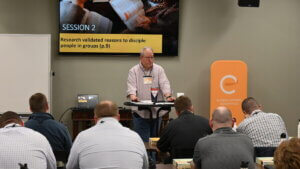Walking down the sidewalk of a non-specific city, I noticed a woman about a half-block ahead of me. She raised up from rummaging through a trash can on the sidewalk. Her appearance was not like everyone else on the sidewalks that day. Her hair dirty and oily, her clothing tattered, wrinkled and unclean, everything about her appearance was alien to her surroundings. The reception of the people around her? To ignore, avoid, and avert getting close to her.
Sitting in a restaurant enjoying lunch while on a road trip, I noticed a homeless man, dressed much like the woman in the earlier scenario, enter the restaurant. He walked straight up to the counter, said something (that I could not hear) to the young man preparing sandwiches. In less than a minute the man was handed a wrapped sandwich from behind the counter. He nodded and I believe said thanks and exited the restaurant with his head down. It turns out the restaurant has a policy of feeding the homeless one sandwich a day if they come in orderly without troubling the customers inside or outside the restaurant.
The main difference in these two scenarios is one is expected, the other is considered a nuisance. We often go out of our way to avoid those not like us, men and women that we do not expect to interact with or meet. The women on the sidewalk just happened to show up as we were walking that way. We were not expecting her and did not desire to spend time with her. The restaurant on the other hand expected and prepared for the homeless. The difference is one is a visitor, one is a guest.
Let’s turn this to the church (or other organization). In your church do you have visitors or guests? There is a difference. The difference is how you treat them. A guest is someone you are expecting. You prepare for them and you want them to stay. A visitor is someone who shows up unexpectedly and you hope they do not stay.
A personal example: Let’s say you invite me to your home for a meal. Before I arrive, you spend time cleaning, cooking and preparing for me. You are expecting me to be your guest. You anticipate my arrival and expect me to stay awhile.
On the other hand, if you do not invite me, yet I show up on your doorstep one evening and announce, “I’m here for supper.” You are not expecting me. You are likely hoping that I am joking and not planning to stay. In this scenario, I am a visitor.
In your church are newcomers treated as guests or visitors? Are you genuinely planning for their arrival and want them to stay even if they do not look, dress, smell, or talk like you? What can you do to make every newcomer feel like a welcomed guest?
George Yates is the Church Health Strategist for the Alabama Baptist State Board of Missions, assisting churches and individuals in pursuing God’s purpose for life. Learn more at ALSBOM.org/revitalization.









 by Dogwood
by Dogwood